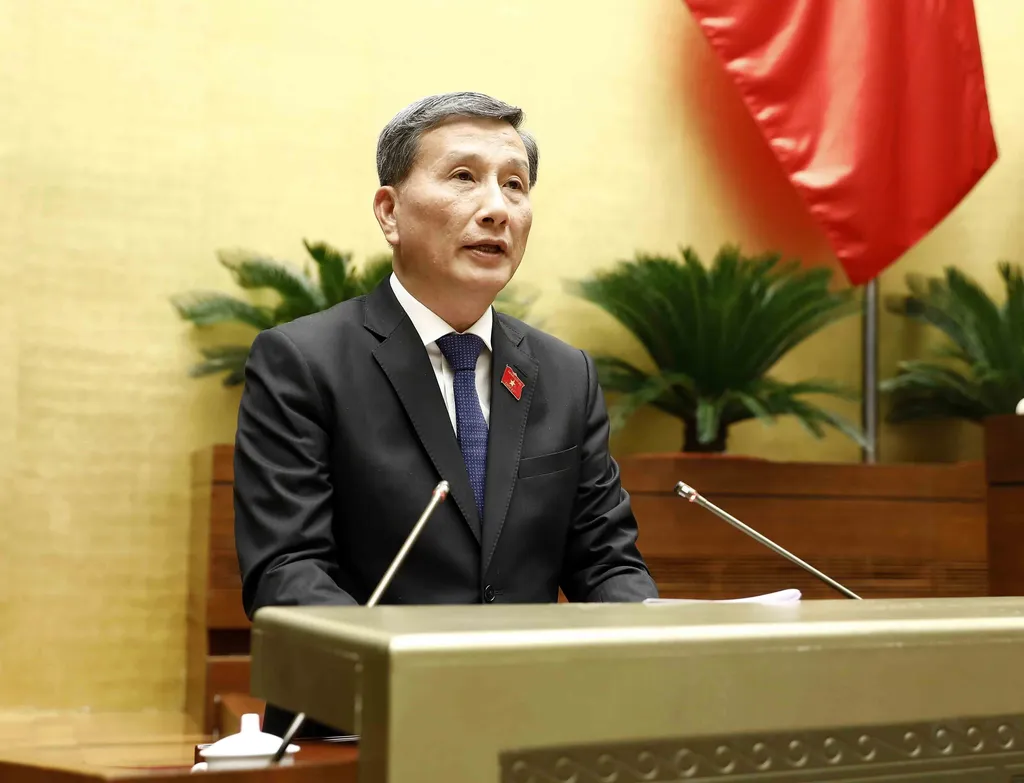 Politics & Law
Politics & Law

 |
| Chairman of the National Assembly’s Science, Technology and Environment Committee Lê Quang Huy at the NA meeting on Tuesday. VNA/VNS Photo |
{ "id": "kHU55Ptrev", "type": "myToolImages", "data": { "data": "" } }
HÀ NỘI — The National Assembly's Science, Technology and Environment Committee on Tuesday afternoon urged more detailed and precise provisions to ensure the product quality, rights of relevant parties and proper consumption culture during transactions conducted in cyberspace.
The committee is responsible for making a verification report on the draft Law on Protection of Consumer Rights (revised).
Representing the report on Tuesday afternoon, the committee chairman Lê Quang Huy said that some provisions in the draft law were only suitable for conventional businesses and transactions.
He said that business models using new technology or digital transformation had yet to be considered, emphasising the need to study and add regulations to protect consumers in e-transactions better.
Regarding specific transactions between consumers and business organisations/individuals (Article 37), there are suggestions to separate the form of multi-level marketing from direct sales because multi-level marketing is not a form of direct selling.
Moreover, separate provisions are needed to regulate multi-level selling because it is an increasingly developed form with many potential factors that violate the interests of consumers.
Regarding dispute resolution content, the draft stipulates four dispute settlement methods, in which negotiation and conciliation is the most commonly used method, up to 80 per cent in handling consumer complaints.
"However, the results of negotiation and conciliation are often not seriously implemented by the parties because the legal value of the minutes of successful negotiation and conciliation is not high," Huy said.
Many consumers do not widely choose the two methods of Arbitration and Court due to complicated procedures, the time it takes to settle and the high costs.
In the past ten years, the number of cases resolved through arbitration and court has been very few.
"Regulations on the conditions for applying the shortened procedure are not clear and not strict enough to have a basis for applying the shortened procedure. For example, the draft law only stipulates the condition of 'simple case', but there are no criteria for what is 'simple'," Huy said.
Revised Law on Inspection
On Tuesday morning, deputies discussed the draft Inspection Law (revised).
Compared to the version discussed at the NA's third session, the draft being debated this time has 111 adjusted articles out of the total 118. A consensus has been reached between the compiling and verification agencies.
Deputy Phan Đức Hiếu from Thái Bình Province said that the inspection law was revised comprehensively, and this was the time to legalise Government's mechanisms and decisions in inspecting enterprises.
Hiếu said that in 2016, the Government issued Resolution 35/NQ0CP on support for business until 2020, in which there were provisions on business inspection, particularly those about the announcement of inspection plans of agencies to avoid overlapping.
According to the resolution, no inspection should be conducted if there was no legal base, especially inspections relating to tax management, Hiếu said.
"However, such administrative support is not sustainable and hardly reassured enterprises," Hiếu said. These contents must be included in the revised law.
According to the Government's report, there are 72 specialised agencies with inspection functions.
"Besides, enterprises operate continuously. It is difficult for the law to be retroactive when an inspection has a statute of limitations. If there are no clear processes and procedures, especially retroactive principles, enterprises face the risk of business stagnation and the interests of shareholders. Investors could be affected," Hiếu said.
"Inspection is to promote law enforcement, not to catch violations. Therefore, it is necessary to follow the principle of risk management, suitable to the nature and scale of business and legal compliance of the business," he said.
Deputy Lê Thanh Vân from Cà Mau Province emphasised that his biggest concern was the institutional reform issue, specifically the Inspection Law's mode of operation.
"Institutional reform focuses on the elements of decentralisation and control of power in the activities of State agencies, but it has not yet been prominent in the draft," Vân said.
As the anti-corruption work has been strongly stepped up, there would be a huge backlog if only the anti-corruption steering committee were responsible for dealing with everything, Vân said, adding that "it is necessary to increase the authority of the inspection agency in the direction that it is allowed to discipline organisations and individuals one level lower, similar to the operating mechanism of the Party Central Committee's Inspection Commission". — VNS